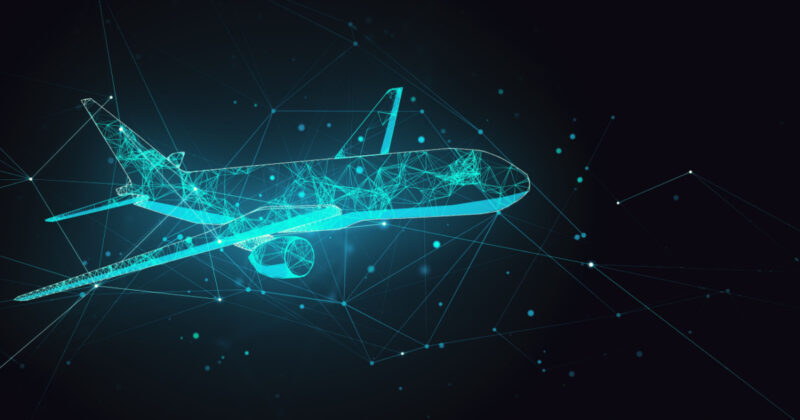AI has truly refined various industries, and the airline sector is no exception. Whether it’s booking a flight or ensuring the smooth operation of aircraft, Artificial Intelligence in the airline industry brings a wave of efficiency and innovation, providing a reliable and safe travel experience.
Traditionally, they relied heavily on scheduled inspections and pilot reports when maintaining airplanes. As everything, even airplane performance, and engines, were used to check manually, it often led to breakdowns in airplanes, which then became a cause of delays and cancellations of flights.
Thanks to artificial intelligence in the airline industry, airplanes are now equipped with onboard sensors that gather data on engine performance and other critical systems. AI analyzes this data to predict which parts might need maintenance, preventing unexpected breakdowns and significantly reducing delays and cancellations, thereby improving the overall travel experience.
This blog will explain how AI is restructuring airline operations, resulting in a smoother flying experience for passengers.
How Does AI Optimize Airline Operations?
AI algorithms are taking the guesswork out of flight planning. By analyzing vast amounts of data on weather patterns, air traffic control, and historical flight information, AI quickly optimizes airline operations and routes efficiently.
This, in turn, helps lessen fuel plane use and even amplifies customer relations by minimizing delays. Algorithms can also generate information on real-time data. Therefore, sensors are used on airplane engine performance, hydraulic systems, and other components, which help prevent failures before they happen.
It is invaluable in managing intricate tasks such as adjusting flight schedules in response to unpredictable weather conditions, allowing airlines to adapt to unforeseen circumstances and keep operations running smoothly.
Overall, AI technology is like a secret weapon for airlines. It allows them to make savvy decisions that save resources, reduce expenses, and make operations run like clockwork. This means passengers can enjoy a hassle-free and more predictable travel experience.
Transforming Luggage Management Through AI Technology
Managing luggage has always been a pain point for both airlines and passengers. Finding lost bags becomes hectic, leading to long waits and queues. Also, the chaotic baggage handling process adds unnecessary stress to passengers’ travel experiences. But there’s good news on the horizon! Artificial intelligence in the airline Industry will refine luggage management, making it faster, more efficient, and less prone to errors.
Now, Airports have AI-powered cameras that allow real-time tracking of luggage throughout the entire journey, from check-in to baggage claim. The cameras work by scanning luggage tags or unique identifiers embedded in suitcases. They also inform passengers about their luggage via their phones to alleviate anxiety.
Robots are now introduced in airports to handle luggage sorting with greater accuracy and speed than traditional manual systems. This reduces human error risk and ensures bags get on the correct flights.
Moreover, AI analyzes bag size, weight, and destination to optimize routing within the airport, minimizing delays and bottlenecks. It also guides passengers through check-in, reducing wait times and long queues.
The Impact of AI on Airline Efficiency and Passenger Experience
Artificial intelligence (AI) is dramatically impacting the airline industry, transforming airline efficiency and the passenger experience.
Nowadays, it’s integrated smoothly to manage crew scheduling, considering their qualifications, rest requirements, and safety regulations. This ensures airlines have the best crew for each flight, prioritizing safety and enhancing the passenger experience. As a result, air travel becomes less stressful and more enjoyable for passengers.
To help elderly passengers, airports have chatbots that provide 24/7 support and answer routine questions easily, freeing up human agents for complex issues. This enhancement boosts efficiency and minimizes passenger wait times.
No doubt, the use of AI technologies is creating a win-win situation for airlines and passengers. Airlines are reaping the rewards of increased efficiency, reduced costs, and better resource management. Meanwhile, passengers are experiencing the best travel journey.
Predictive Maintenance – Minimizing Downtime and Costs Through AI
In the fast-paced world of airlines, keeping planes in the air is paramount. That’s where predictive maintenance comes in, and artificial intelligence in the airline industry is supercharging this process.
Traditionally, aircraft maintenance has relied on scheduled inspections and pilot reports. This reactive approach meant problems could go undetected until they caused breakdowns, leading to delays and repairs.
AI flips the script. Airplane sensors constantly collect data on engine performance, hydraulic systems, and other critical components. This data goldmine is fed into AI algorithms that analyze it for patterns and anomalies.
By analyzing vast amounts of sensor data, AI can predict potential equipment failures before they occur. This allows airlines to proactively schedule maintenance and replace parts before they malfunction and cause problems.
Think of it as having a fortune teller for your airplane! AI gives airlines the foresight to address issues before they snowball into major problems.
So, the next time you board a plane, remember the invisible power of AI working behind the scenes. Predictive AI-powered maintenance keeps you soaring through the skies with minimal disruptions!
Top Applications of AI in the Airline Industry
Artificial Intelligence in the airline industry has taken over all the minor difficulties, making all the operations run efficiently. To make passenger travel stress-free, it analyzes weather information and recommends slight adjustments during flights to avoid turbulence or headwinds, which ultimately helps reduce fuel usage. Here’s a breakdown of some of the top applications.
1. Fuel Efficiency at New Altitudes
AI algorithms handle complex datasets and air traffic control information to create the most efficient flight paths, minimizing fuel consumption and reducing environmental impact. It can adjust real-time routes to account for airspace congestion or weather delays.
2. Predicting Delays for Smoother Journeys
With AI, airlines can quickly predict potential disruptions by analyzing weather patterns. This allows them to quickly adjust schedules, ensuring passengers have a better travel experience. It also helps optimize crew schedules and make necessary arrangements for delays or cancellations, reducing the inconvenience for passengers.
3. Optimizing Pricing Strategies
With AI, airlines can analyze historical data and real-time market trends to optimize ticket pricing strategies, upgrades, and ancillary services. This helps increase revenue and ensures competitive pricing in the market.
4. AI Chatbots
Virtual assistants powered by AI are available for passengers around the clock to answer frequently asked questions, handle booking modifications, and offer real-time updates throughout the journey, providing constant support to passengers.
5. Personalized Travel Recommendations
AI surveys passenger data to suggest the best flight options, including connecting flights, destinations, and even in-flight entertainment based on individual preferences. This enhances
5. AI-Powered Crew Management:
Now no need for managers as AI algorithms are there to suggest crew scheduling by considering pilot qualifications, rest requirements, and passenger demand. This ensures airlines have the right crew for each flight, minimizes delays due to crew availability, and optimizes crew work hours to comply with regulations.
Wrapping Up
Artificial Intelligence in the airline industry has ensured that passengers have a safe flight by taking care of every adjustment—no doubt in the future. Forget airport maps and frantic searches. AI-powered facial recognition and location tracking apps will guide you, recommend the nearest security lane based on real-time wait times, and inform you of any sudden gate changes.
We can expect AI to continue transforming how we travel, making air travel safer, more efficient, and more enjoyable. So sit back, relax, and enjoy the ride – with AI technology at work behind the scenes,

Dawood is a digital marketing pro and AI/ML enthusiast. His blogs on Folio3 AI are a blend of marketing and tech brilliance. Dawood’s knack for making AI engaging for users sets his content apart, offering a unique and insightful take on the dynamic intersection of marketing and cutting-edge technology.










